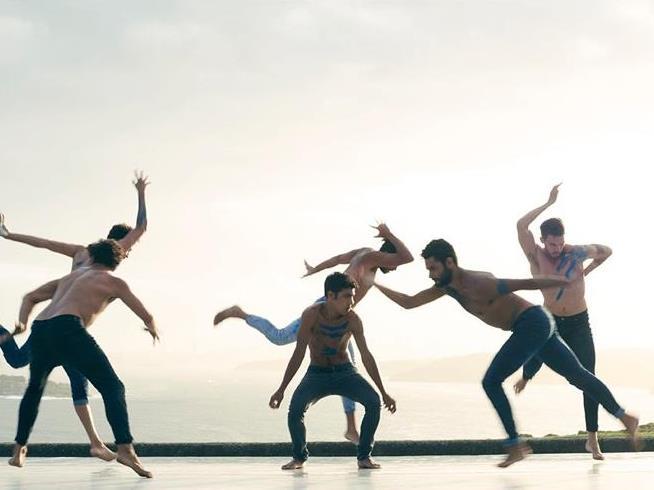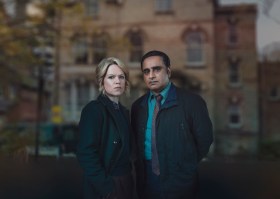Photograph by Edward Mulvihill.
The Bangarra Dance Theatre’s first foray into feature-length cinema offers a new perspective on the creativity and power of their contemporary dance performances. A redux of a 2000 production, Spear explores the journeys of indigenous men in both urban and remote settings.
Bangarra’s artistic director and director of the film, Stephen Page, uses dance and movement to present a non-linear narrative, exploring pressing social issues. A richly evocative soundscape by David Page results in an immersive experience, mixing traditional and modern music and song. With barely any dialogue the plot is deliberately opaque and it’s the arresting visuals and sound that propel the film.
Beginning with an initiation sequence the film follows the lead character Djali played by Hunter Page-Lochard (son of Stephen Page) as he bears witness to a series of vignettes that depict subjects like prison, abuse, alcoholism, and suicide. He is accompanied by an elder who represents a spiritual worldview and a traumatised inner-city homeless man played impressively by Aaron Pederson who embodies the crushing weight of an identity torn between two cultures. Although the story depicts issues facing men in contemporary world there are also strong female presences in the film whose characters occupy a spiritual or dreamlike space.
The dance sequences are superb as to be expected from one of the country’s premier contemporary dance companies. Translating the choreography from live performance to film, cinematographer Bonnie Elliot has captured detail and nuance that can get lost in a theatrical context. Elements like a close-up of arms and shoulders moving fluidly, a facial expression heightening emotion or a beautifully framed group formation all add depth to the repertoire.
Dark comedy is also present in a routine that challenges racial stereotypes and features familiar kitsch Australiana costumes. A performance to the British singer Charlie Drake’s racist yet popular 1961 song ‘My Boomerang Won’t Come Back’, features cheesy moves and tongue-in-cheek humour in a community hall setting. Similarly, by including a scene from the movie Jedda (1955) Page re-appropriates the iconic Australian film and it’s patronising depiction of indigenous people.
For all it’s hard subject matter, the imagery in Spear also resonates with power, beauty and pride in abundance. The spiritual connection to country is palpable in footage shot in Arnhem Land. Natural elements are shot beautifully like smoke, ochre, sea and country all making for a mythic cinematic experience. In the final scenes a stunning performance before a backdrop of sea and the distant Sydney skyline is transcendent and cleansing, a conclusion to the reckoning with men’s business that has come before it. The Bangarra dancers seemingly effortless display of positivity and strength come through clearly in this unconventional film. Spear is proof that Stephen Page’s branching out into a new creative medium was a wise move.
Rating: Four and half stars out of five
Spear
Director: Stephen Page
Rated: M
Release date: National release March 2016
Distributor: CinemaPlus
Actors:
Director:
Format:
Country:
Release:





